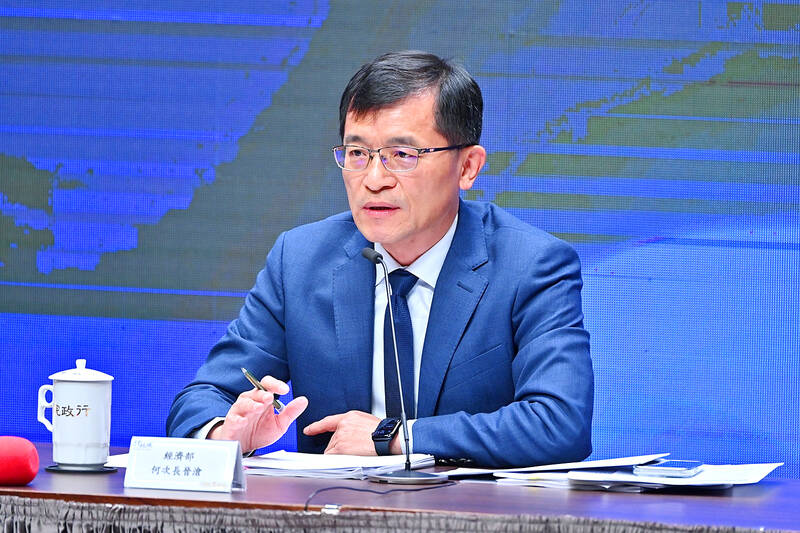The Ministry of Economic Affairs yesterday said certain local industries should position themselves for the effects of the incoming US administration after a report said that US president-elect Donald Trump was considering declaring a national economic emergency to provide a legal ground for his tariff plans.
A CNN report on Wednesday said that Trump was mulling levying new tariffs on all imported goods from allies and adversaries by using the International Economic Emergency Powers Act, which authorizes a president to manage imports during a national emergency.
The news renewed a sense of uncertainty on trading floors across Asia yesterday, with the TAIEX in Taipei sinking 1.39 percent, while other regional markets such as Hong Kong, Shanghai, Tokyo, Sydney, Wellington, Mumbai and Bangkok also moved lower.

Photo courtesy of the Executive Yuan
Deputy Minister of Economic Affairs Ho Chin-tsang (何晉滄) at a news conference after the regular Cabinet meeting yesterday said the possible implementation of new tariffs by the incoming Trump administration might have an impact on Taiwan’s information and communications technology sector, as well as automobile industries.
“We are currently discussing contingency responses with relevant trade associations,” Ho said.
The ministry’s preliminary understanding is that Trump’s potential national economic emergency declaration could mainly affect Taiwan’s auto parts, high-end servers, laptops and desktops destined for the US market, compared with other products, he said.
The ministry has been in close contact with firms and trade associations in the two industries and would discuss the details with industry players after the new US government officially announces the content of its policy, Ho said.
The ministry would also discuss with trade associations to assist firms willing to invest in the US to address the tariff issue, he said.
Following the US presidential election on Nov. 5 last year, Vice Premier Cheng Li-chun (鄭麗君) has headed a task force in charge of trade and technology exchanges with the new US administration.
Cabinet spokesperson Michelle Lee (李慧芝) at yesterday’s news conference said that the task force still holds meetings on a regular basis and would unveil more details about its responses after Trump takes office on Jan. 20.

NEW IDENTITY: Known for its software, India has expanded into hardware, with its semiconductor industry growing from US$38bn in 2023 to US$45bn to US$50bn India on Saturday inaugurated its first semiconductor assembly and test facility, a milestone in the government’s push to reduce dependence on foreign chipmakers and stake a claim in a sector dominated by China. Indian Prime Minister Narendra Modi opened US firm Micron Technology Inc’s semiconductor assembly, test and packaging unit in his home state of Gujarat, hailing the “dawn of a new era” for India’s technology ambitions. “When young Indians look back in the future, they will see this decade as the turning point in our tech future,” Modi told the event, which was broadcast on his YouTube channel. The plant would convert

‘SEISMIC SHIFT’: The researcher forecast there would be about 1.1 billion mobile shipments this year, down from 1.26 billion the prior year and erasing years of gains The global smartphone market is expected to contract 12.9 percent this year due to the unprecedented memorychip shortage, marking “a crisis like no other,” researcher International Data Corp (IDC) said. The new forecast, a dramatic revision down from earlier estimates, gives the latest accounting of the ongoing memory crunch that is affecting every corner of the electronics industry. The demand for advanced memory to power artificial intelligence (AI) tasks has drained global supply until well into next year and jeopardizes the business model of many smartphone makers. IDC forecast about 1.1 billion mobile shipments this year, down from 1.26 billion the prior

People stand in a Pokemon store in Tokyo on Thursday. One of the world highest-grossing franchises is celebrated its 30th anniversary yesterday.

Zimbabwe’s ban on raw lithium exports is forcing Chinese miners to rethink their strategy, speeding up plans to process the metal locally instead of shipping it to China’s vast rechargeable battery industry. The country is Africa’s largest lithium producer and has one of the world’s largest reserves, according to the US Geological Survey (USGS). Zimbabwe already banned the export of lithium ore in 2022 and last year announced it would halt exports of lithium concentrates from January next year. However, on Wednesday it imposed the ban with immediate effect, leaving unclear what the lithium mining sector would do in the